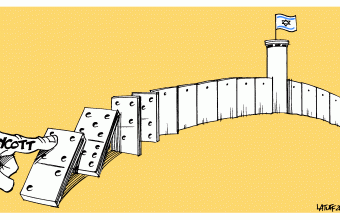Over 40 Portuguese photographers, teachers of photography and photography students pledged on Saturday, which marked World Photography Day, not to accept professional invitations or financing from Israel, and to” refuse to collaborate with Israeli cultural institutions complicit in Israel’s regime of occupation, colonialism and apartheid,” according to the official website of the Boycott Divestment and Sanctions (BDS) movement.
According to the statement from the BDS movement, the pledge was the “first of its kind,” as the photographers pledged to boycott Israel “until it complies with international law and respects the human rights of Palestinians.”
Among the pledge supporters were Jo o Pina, winner of the 2017 Pr mio Esta o Imagem Viana do Castelo, Portugal’s only photojournalism award, TV personality and travel photographerNuno Lobito, Miguel Carri o, winner of the 2012 Concelho da Bienal de Vila Franca de Xira award, Jos Soudo, a veteran Photography teacher and Historian, and Jo o Henriques, winner of the 2015 Fnac New Talents Award.
According to Ma’an News Agency, the statement quoted Carri o as saying: “Having witnessed first-hand the crimes Israel is committing daily against Palestinians, signing up to this initiative has become a natural step. It is fundamental to promote this effort through all means possible.”
“It is time for Israel’s brand of apartheid to enjoy the same treatment as South African apartheid and be target of a comprehensive international boycott until it respects human rights,” the statement quoted Lobita as saying.
“Photographers can no longer be silent about the treatment of their Palestinian colleagues living under an indefensible occupation that has lasted for over half a century. Palestinians have called for solidarity through boycotts and this pledge is our practical contribution to their struggle.”
The statement noted the struggles of Palestinian photographers and journalists under the Israeli occupation, highlighted that artists have been denied visas by the Israeli military establishment, preventing them from participating in conferences and performances internationally, in addition to being detained at checkpoints, arrested, having their equipment broken, and being “exposed to the same violence perpetrated by the Israeli army on all Palestinians.”
The BDS movement was founded in 2005 by a swath of Palestinian civil society as a peaceful movement to restore Palestinian rights in accordance with international law through strategies of boycotting Israeli products and cultural institutions, divesting from companies complicit in violations against Palestinians, and implementing state sanctions against the Israeli government.
BDS activists target companies that act in compliance with Israel’s illegal occupation of the West Bank, including East Jerusalem, and encourage supporters to avoid buying Israeli products in order to put pressure on the Israeli government to end the half-century occupation of the West Bank and East Jerusalem the decade-long Israeli siege on the Gaza Strip.
As support for the movement has grown, the Israeli government has introduced anti-BDS policies, including passing a law in March banning foreigners who have openly expressed support in BDS from entering the country.
Search IMEMC: “boycott”

